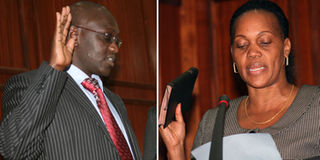House team approves crucial Kenya election panel

Photos/FILE
Prime Minister Raila Odinga’s candidates Ekuru Aukot (left) and Rosa Akinyi Buyu were similarly given the nod.
A parliamentary committee on Tuesday voted to put reforms firmly on track by approving a panel that will vet electoral commissioners.
The final decision on the appointment of the panel is Parliament’s and is likely to be taken by the full House on Wednesday.
In a somewhat convoluted appointment process that seeks to ensure the employment of the right calibre of people at the Independent Electoral and Boundaries Commission as well as to balance political interests, commissioners are to be recruited by a panel whose members are picked by the President, the Prime Minister and independent organisations.
Those endorsed by the Constitution Implementation Oversight Committee on Tuesday included President Kibaki’s nominees Marion Wanjiku Mutugi and Mwanyengela Ngali.
Prime Minister Raila Odinga’s candidates Ekuru Aukot and Rosa Akinyi Buyu were similarly given the nod.
Judicial Service Commission nominee Isaac Lenaola, Ms Irene Cheptoo Keino nominated by Kenya Anti-Corruption Commission Advisory Board and Ms Sophie Njeri Moturi chosen by the Association of Professional Societies in East Africa (Apsea) were also approved.
Constitutional threshold
“We have got four women and three gentlemen, so we’re within the constitutional threshold of not more than two thirds of either gender,” committee chairman Abdikadir Mohamed said after day-long interviews of 10 nominees.
He was flanked by vice-chairperson Millie Odhiambo. The committee rejected Mr Charles Wambugu Kariuki, nominated by the KACC advisory board, Dr William Okello Ogara from Apsea and Ms Emily Ominde of the JSC.
The nominees’ names will be tabled in Parliament today for either approval or rejection by MPs. “As a committee, we have picked the seven that we think are the people who should handle this work.
“We intend to bring the matter to the House tomorrow, so that it is out of the House by Thursday and they are appointed as soon as possible.
“We don’t want to push it to Monday,” Mr Mohamed said, adding: “We have a short deadline; that’s why we had to act speedily.”
Parliament has up to July 31 to appoint the panel.
“If any issues come up, Parliament can act before they pass the report. If anyone has issues, we’ll be more than happy to hear,” the CIOC chairman said.
There were concerns about regional balance because North Eastern, Eastern and Western were not represented among the nominees, but the CIOC team was satisfied with those picked.
In its report, the committee will address the issue of political affiliations and how those with political ambitions will be handled so that they do not pick referees for a match in which they’ll also play, the chairman said.
Mr Ngali and Ms Buyu told the committee that they were active politicians who have vied before and were still active members of political parties.
Mr Ngali is the Wundanyi branch chairman of Narc Kenya, while Ms Buyu is a member of ODM.
Prof Mutugi said she won’t vie again. In 2007, she was the deputy secretary-general of the Democratic Party; she vied in Ndia constituency for the parliamentary seat and lost.
Meanwhile, two commissioners of the Judicial Service Commission were yesterday hard-pressed to explain their decision to pick fewer women for the Supreme Court.
Justice Lenaola and Ms Ominde, a principal magistrate, said they were a minority in the commission.
The said they knew of the constitutional threshold of “not more than two thirds of either gender” in elective and appointive posts, but they seemed to suggest that they were overpowered within the commission.
“I have only one vote,” said Ms Ominde, who like Mr Justice Lenaola, has been picked by the JSC to sit in the Selection Panel.
During the interviews, the nominees were put to task over their political affiliation. Prof Mutugi said: “As a professor, I actually hold the future in my hands. By the stroke of a pen, a student passes or fails.
“If I have not interfered with that one, I don’t think that my participation in politics for one year in my 51 years of life will interfere with (my work)... I only have one thing that influences what I do: my conscience,” she said.
Mr Ngali was questioned about his party-hopping in 2002 and in 2007 elections.




